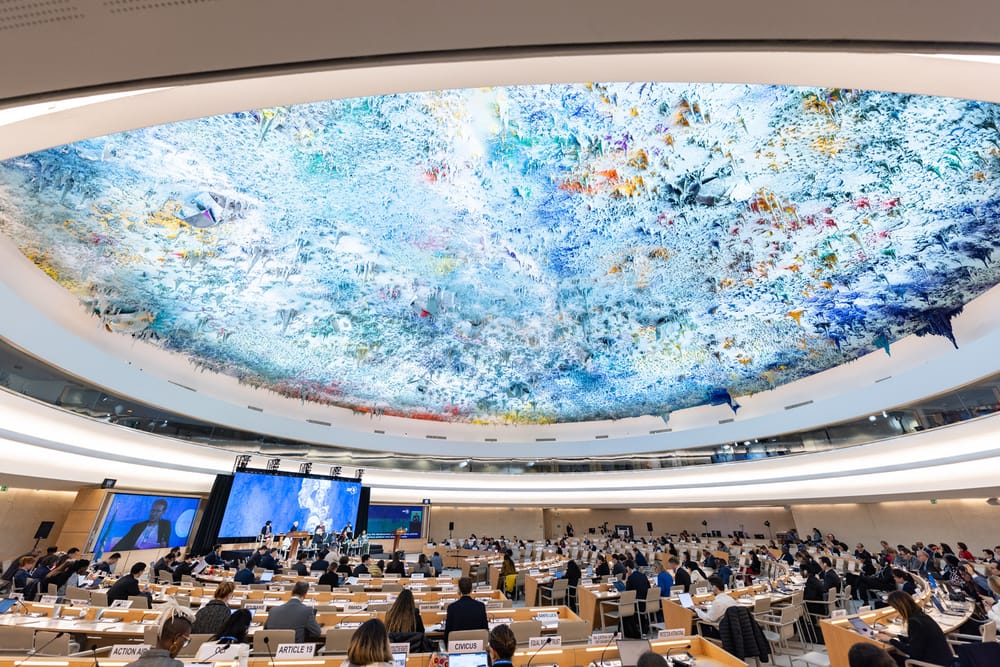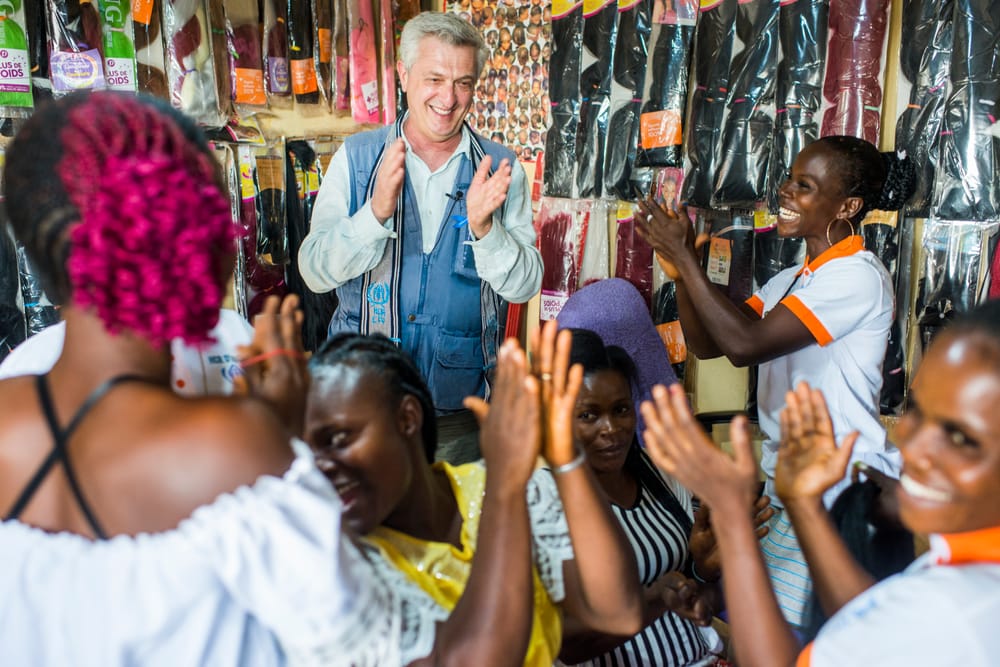By Ching Wei Sooi
The current state of space exploration
The advance and diffusion of space technologies should be embraced, and everybody has a stake in space in the truest sense of the word.
Space is a - if not the - most rapidly changing technological environment of our time (perhaps second only to artificial intelligence or cybersecurity). More satellites were launched in 2022 than any year before; and more satellites were launched in the past five years than in the previous sixty. The global space market, estimated to have been worth 424 USD billion in 2022, has surpassed 500 USD billion in 2023, and is estimated to reach 737 USD billion by 2030. More states than ever before are developing space policies, utilising space for growth, promoting their space industries, operating satellites, and becoming active participants across the multilateral fora. Non-state actors are increasingly becoming prominent within industry, academia and civil society. These trends are expected to continue, if not accelerate, well into 2024 and beyond.
The advance and diffusion of space technologies should be embraced, and everybody has a stake in space in the truest sense of the word. Space technologies positively impact all the Sustainable Development Goals, and humanity’s modern way of life is dependent on space services and assets. Satellites facilitate secure, reliable communication and time synchronisation between financial institutions. Maritime shipping relies on satellites for navigation and tracking. Space is crucial for effective climate action; more than half of the essential climate variables (characterising Earth’s climate) are monitored from space. Crucially, our continued use of and benefit from space technologies and applications relies on ensuring that space is safe, secure, and sustainable.
Challenges in space
Unfortunately, not all developments are positive. Some experts caution that the Kessler syndrome, whereby space debris has reached such a density in orbit that runaway collisions create chain reactions of more and more debris, is already unfolding. The European Space Agency’s latest estimates of space debris are: 36,500 objects greater than 10 cm, 1 million objects from greater than 1 cm to 10 cm, and 130 million objects from greater than 1 mm to 1cm.
The potential transposing of terrestrial tensions on Earth into space is a chief concern. The development of counter-space technologies remains unceasing. There is no universally accepted definition of counter space, but in UNIDIR’s recently published Lexicon for Outer Space Security, we describe this as “capabilities, techniques, or assets that can be used against another space object or a component of a space system in order to deliberately deny, disrupt, degrade, damage or destroy it reversibly or irreversibly, so as to gain advantage over an adversary”.
Additionally, the advent of technical capabilities designed to remove space debris, or repair and refuel assets in space, while creating new opportunities, also increases the risk of miscalculation, misunderstanding, and miscommunication resulting from the fear that they could be repurposed by adversaries to harm other space objects. Furthermore, as states seek to establish bases on the Moon and Mars, it has spurred questions regarding territoriality. There is also renewed interest in the possibility of space mining, which raises questions about the appropriation of celestial bodies.
The intensification of human activities in space calls for important considerations on what constitutes ethical space use and exploration, how we navigate cultural heritage in space; and the protection of cultural and historical artefacts, sites, and traditions that have significance beyond Earth. Many Indigenous cultures, for instance, have deep connections to the cosmos.
Geneva’s role in space security
Given the rapid development of space activities and (counter) space technologies, what are the implications for the future of global diplomacy and security? Geneva itself has long served as a hub for multilateral debate and dialogue around space security. As space-enabled technologies and services permeate evermore into the daily ongoings of everyday citizens, it is a poignant moment for the broader Geneva community to take stock of the current state of play. Preventing an arms race in outer space (PAROS) has been an ongoing agenda item of the Conference on Disarmament based in Geneva. Recently, Geneva hosted the Open-ended Working Group (OEWG) on Reducing Space Threats through Norms, Rules, and Principles of Responsible Behaviours, which concluded in September 2023. Geneva also hosted the Group of Governmental Experts (GGE) on Further Practical Measures on PAROS, which concluded in April 2019. Looking ahead, a second GGE on PAROS will take place over 2023 and 2024 in Geneva. Further on, it is likely that two space security OEWGs will be running in parallel between 2025-2026 and 2024-2028.
More than 1.7 million non-geostationary satellites have been registered thus far and may be launched into orbit by 2030.
Additionally, Geneva-based institutions have important roles to play in coordinating space activities. The International Telecommunications Union handles the allocation of scarce orbital slots and radiofrequency spectrums. More than 1.7 million non-geostationary satellites have been registered thus far and may be launched into orbit by 2030. The International Committee of the Red Cross provides expertise on the human security and legal dimension of space – and emphasises the grave humanitarian consequences if conflict should break out in space. There also appears to be the co-location of a growing space research and industry sector in Geneva. Space security discussions will benefit from active engagement with such non-governmental stakeholders.
And what about the role of United Nations entities based in the Palais des Nations? Amidst this diplomatic and technical whirlwind, the United Nations Office for Disarmament Affairs provides secretariat and substantive support functions to various space security processes (e.g., GGEs and OEWGs), while the United Nations Institute for Disarmament Research’s (UNIDIR) Space Security Programme holds workshops, briefings, and seminars, and produces reports and tools. Notable examples include UNIDIR’s Lexicon for Outer Space Security and Space Security Portal, as well as UNIDIR’s annual flagship Outer Space Security Conference.
The upcoming GGE represents a prime opportunity to build on deliberations and produce a consensus report – and provide an opening for interested parties to facilitate that ideal outcome in its intersessional periods.
For the space security community, PAROS represents our North Star. Looking ahead, the upcoming GGE represents a prime opportunity to build on deliberations and produce a consensus report – and provide an opening for interested parties to facilitate that ideal outcome in its intersessional periods. These processes and ongoing activities create opportunities for active engagement on related issues. This is key for trust and confidence building, the widespread participation of various actors, the inclusion of different perspectives, and working towards common understandings. Dialogue tracks, policy advisory, and workshops are only a small selection of convening events that could facilitate progress on PAROS.
There is scope for cautious optimism. The Subsidiary Body on PAROS in the Conference of Disarmament adopted a consensus report in 2022. In 2023, the Disarmament Commission’s Working Group II reached a consensus and provided recommendations to promote the implementation of transparency and confidence-building measures to achieve PAROS. The OEWG on Reducing Space Threats, while failing to adopt a consensus report, witnessed significant cross-regional cooperation. As UN Under Secretary Guy Ryder indicated at UNIDIR’s recent Outer Space Security Conference 2023, the process “advanced new ideas in an open and inclusive setting and fostered new North-South partnerships”.
States around the world are growing increasingly cognisant of the need to develop national, regional, cross-regional, and multilateral space policies, strategies, and positions. In light of increased human activity in space, the need for ethical frameworks guiding the peaceful use and exploration of outer space, and the development of counterspace capabilities, space security diplomacy in Geneva will undoubtedly become increasingly salient. The opportunities it can create for space governance should not be understated.
About the author
Ching Wei Sooi is a Graduate Professional in the Space Security and WMD Programmes at UNIDIR.
The views expressed in the publication are the sole responsibility of the individual author. They do not necessarily reflect the views or opinions of the United Nations, UNIDIR, its staff members or sponsors. They do not purport to reflect the opinions or views of the Geneva Policy Outlook or its partner organisations.





